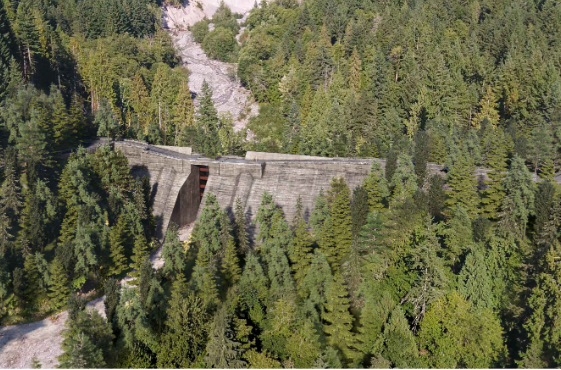The Cheekye Fan debris barrier that is proposed to serve as a protective barrier for the upcoming Cheekye Fan neighbourhood development has passed a milestone.
“The issue of debris flow hazard here is the most documented and studied debris flow hazard [in an alluvial fan in Canada], so to be getting closer to positively impacting that is truly remarkable, and I look forward to upcoming discussions about the funding piece,” said Mayor Armand Hurford.
in an update to council, staff said that the independent expert review panel charged with overseeing the project has deemed its design adequate.
The barrier, which is to be located on the Cheekye River, south of Cat Lake, will protect a proposed residential development that is expected to be located immediately north of Don Ross Middle School and between Brackendale Elementary and Highway 99.
Its design will be a wall with a six-metre wide opening that will allow the Cheekye River to pass through, while filtering out major pieces of debris. Once constructed by the developer, its ownership will be transferred to the municipality, which will be responsible for owning and operating the facility.
David Roulston, the municipality’s manager of municipal infrastructure, said the panel, in its letter of opinion, concluded that the design has been completed to “the expected standard of practice” for this stage of the project.
“This is a major milestone for this project, which has been ongoing for 10 years,” Roulston said.
Back in 2018, the debris barrier was a condition imposed by the municipal council of the day on its third reading of the rezoning application of the large residential-commercial proposal known as the Cheekye Fan project.
Its proponent is Sqomish Sea to Sky Developments, a partnership between Matthews West and the S岣祑x瘫wú7mesh Úxwumixw (麻豆社国产Nation). Matthews West was formerly known as 麻豆社国产Cornerstone Developments. Matthews West is a subsidiary of Matthews Southwest.
The project aims to bring about 1,200 units to the Brackendale area, but because that area is in an alluvial fan — a high-risk flood zone — the District has required the applicant to create a debris flow barrier to protect against potential landslides.
A staff report notes there is potential for a debris flow as large as 5.5 million cubic metres to occur from the flanks of Mount. Garibaldi and slide along the Cheekye River with the potential for the debris to spill into developed areas throughout Brackendale and further downstream into Garibaldi Estates.
During the briefing to council, Roulston explained the design’s tolerance for risk of loss of life.
“We have adopted a standard that is becoming a bit of a precedent internationally as well as nationally,” he said.
The standard has been adopted previously in places like North Vancouver, based on a system from Hong Kong, which are areas with landslide risk, he said.
The District will tolerate a 1:10,000 chance of death for developments that already exist.
For the Cheekye Fan project and other new developments, it will demand a higher standard of 1:100,000.
Alex Strouth of BGC Engineering, which was contracted to help with the project, said that the risk tolerance thresholds adopted by the municipality are the strictest thresholds used anywhere in the world.
“There’s no stricter one that anybody refers to,” said Strouth.
“The reason that the expert panel felt that it was appropriate is because the idea is to introduce new people into a hazard zone.”
He said the 1:10,000 risk for existing developments is similar to that of driving a car. The idea is that the risk level should be no higher than the kind of risks people accept in their everyday lives.
The 1:100,000 is an order of magnitude less than that, and it’s similar to the risk of someone drowning, Strouth said.
“The group risk tolerance thresholds are the same that would be used if you were putting, say, a chemical factory in an existing neighbourhood in a place like the UK or Hong Kong,” he said. “It’s something that is very stringent and strict.”
These new standards will exceed standards of older development.
For example, Roulston added, BGC Engineering concluded the current existing Brackendale community does not meet the 1:10,000 risk tolerance threshold.
“The existing development currently has an unacceptable risk, meaning that the risk to loss of life is higher than that 1:10,000,” he said.
More details on the Cheekye barrier project will be discussed at a future date.
***Correction April 21, 2023, 4:05 p.m.: Updated to reflect that the residential development, not the barrier, is expected to be located immediately north of Don Ross Middle School and between Brackendale Elementary and Highway 99. The barrier itself will be on the Cheekye River, south of Cat Lake.


.png;w=120;h=80;mode=crop)



